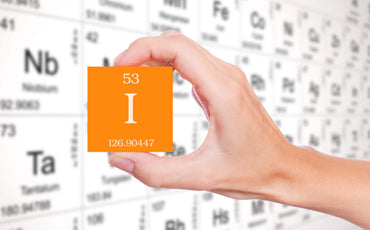The adrenal gland is an important component of the endocrine system, responsible for the production of hormones and neurotransmitters essential for normal biological functions in humans. Adrenal problems can be caused by factors that destroy the glands or hamper its secretory functions (Addison’s or Cushing’s). Nutraceuticals provide symptomatic relief of symptoms for patients suffering from all forms of adrenal problems. Of all available integrative therapy options, TriFixx™ provides superior relief from a comprehensive list of symptoms associated with adrenal fatigue.
INTRODUCTION: Adrenal Gland Health And Functioning
The endocrine system consists chiefly of endocrine glands that release chemical mediators into the bloodstream for transport to target organs of the body. At the target site, these chemical agents affect biological functions that are essential for a normal life and healthy living. The adrenal gland is an important endocrine organ in humans, which is primarily responsible for the secretion of the hormone with essential roles in blood pressure regulation, immunity modulation, metabolism, and glucose homeostasis. In actual sense, the adrenals describe a pair of triangular-shaped glands located directly on top of the kidneys. The adrenal cortex (outer layer of the glands) secretes steroids, including: cortisol, androgens, and aldosterone. The adrenal medulla (inner part of the adrenal gland), however, produces epinephrine and norepinephrine.
Cortisol is a glucocorticoid with the principal role of regulating the glucose metabolism. Beyond the regulation of glucose metabolism, glucocorticoids can also act as a mild cardiac stimulant with vasoactive (blood pressure) properties. In healthy humans, cortisol influences the rate of glucose production to match the body’s metabolic needs. In severe cases of glucose depletion, glucocorticoids can also mobilize the body’s store of proteins for conversion to glucose. This mechanism balances metabolic glucose debt and combats fatigue.
Aldosterone, on the other hand, primarily stimulates reabsorption of sodium and subsequent secretion of hydrogen and potassium ions in the kidneys. This action is necessary to balance the body’s electrolyte composition. The hormones of the Adrenal medulla – epinephrine and norepinephrine - act as important neurotransmitters that mediate the body’s innate response to stress and the fight-or-flight conditions.

Clinical Overview Of Adrenal Problems
Just as in other systems of the body, an impairment of the adrenal glands can alter the normal pattern of adrenal hormone secretion and faults the functions of these hormones. Generally, the adrenal gland problems can be broadly discussed under: primary adrenal insufficiency, secondary adrenal insufficiency, and acute adrenocortical insufficiency.
-
Primary Adrenal Insufficiency
This condition is also known as Addison’s disease. Cases of primary adrenal insufficiency (PAI) are rare in the population; however, they can be severe on presentation. In PAI, the three layers of the adrenal cortex are gradually destroyed, leading to structural damage to the glands. Destruction of the glandular layers can be initiated by fungal infections, tuberculosis, metabolic failure, and autoimmune reactions. As glandular destruction progresses steadily, the rate of steroid secretion reduces, and the biological response to stress is greatly impaired. As the condition progresses, the level of glucocorticoids and androgens becomes depleted. Clinical symptoms of this condition develop at a stage when about 90% of the adrenal tissues have been destroyed. Symptom presentation in patients suffering from PAI is non-specific. However, the symptoms include: abdominal pains, dehydration, loss of appetite, hyperpigmentation, weight loss, irregular menstrual cycle in females, low libido, and recurrent fatigue.
-
Secondary Adrenal Insufficiency
Unlike in primary adrenal insufficiency, the cause of secondary adrenal insufficiency (SAI) is definite: a lack of adrenocorticotropic hormone (ACTH), a hormone produced by the pituitary gland. This hormone is directly responsible for the regulation of cortisol production by the adrenal gland. Any disease that affects the functional integrity of the anterior pituitary and interferes with ACTH production can cause secondary adrenal insufficiency. People who use steroids excessively without medical supervision are at risk of developing SAI. Symptom presentation in SAI is closely related to that obtained in PAI. However, patients don’t experience dehydration and hyperpigmentation as the level of ACTH is not significantly raised. Symptoms observed in patients suffering from SAI include: low glucose levels, visual blurring, generalized body weakness, fatigue, and profound weight loss.
-
Acute Adrenocortical Insufficiency
Acute adrenocortical insufficiency (adrenal crisis) is common only in patients with primary adrenal insufficiency. In contrast to other adrenal problems, the adrenal crisis has a sudden onset with a set of non-specific symptoms, which can be elusive on observation and make an accurate diagnosis difficult. A diagnosis of acute adrenal insufficiency is common in PAI patients with acute stress, infection, and adrenal haemorrhage. This condition worsens an initial diagnosis of PAI. Just as in other medical conditions, the prognosis of the adrenal crisis is significantly improved with early diagnosis and proper medical care. Patients are suffering from this condition experience: hypoglycaemic seizures, dehydration (especially in children), vomiting, tachycardia, confusion, and abdominal pain.
-
Overproduction Of Cortisol By The Adrenal Glands
Cushing’s syndrome occurs when your body is exposed to high levels of the hormone cortisol, for a long time. Cushing’s syndrome, is sometimes called ‘hypercortisolism’. Signs of Cushing’s syndrome, include: a fatty hump between the shoulders, a rounded face, pink or purple stretch marks on the skin, thinning fragile skin that bruises easily, slow healing of (a) cuts (b) insect bites and (c) infections, weight gain, fatty tissue deposits, irregular or absent menstrual periods, decreased libido, decreased fertility, erectile dysfunction and thicker or more visible body and facial hair (hirsutism) in females.
Diagnosis Approach
The diagnosis of adrenal insufficiency is based solely on an evaluation of the adrenal hormone levels. A deviation from normal levels suggests an abnormality of the adrenal glands. Charting cortisol levels is important to correct the diagnosis of adrenal insufficiency. In differentiating between the variants of adrenal insufficiency in patients presenting with non-specific or conflicting symptoms, it is important to determine the cause of low cortisol secretion. Low cortisol levels can be primary, secondary, or influenced by ACTH deficiency. In cases of suspected autoimmune origin, imaging tests may be conducted to confirm calcifications and hyperplasia of the adrenal glands as the disease progresses.
Management Of Adrenal Problems With TriFixx™ Nutraceuticals
Symptomatic treatment is an important aspect of adrenal insufficiency therapy in humans. In most cases of adrenal problems, there is an altered glucose metabolism leading to recurrent bouts of adrenal fatigue. Chronic stress also worsens this condition as the biological function that combats stress becomes suboptimal. Nutraceuticals are becoming increasingly popular in the management of adrenal insufficiency.
TriFixx™ Adrenal Fixx™, a non-prescription nutraceutical, provides a comprehensive fix for the adrenals. In an integrative therapy approach, this product combats adrenal fatigue and reinvigorates the body’s glucose metabolism cycle. Patients can score their symptoms using the adrenal questionnaire, to not only see whether they could benefit from using the nutraceutical; but equally, how they are tracking whilst on it. TriFixx™ offers a reliable and innovative approach to fixing adrenal problems.
Related Products
SHOP HERE >>> 
REFERENCES













